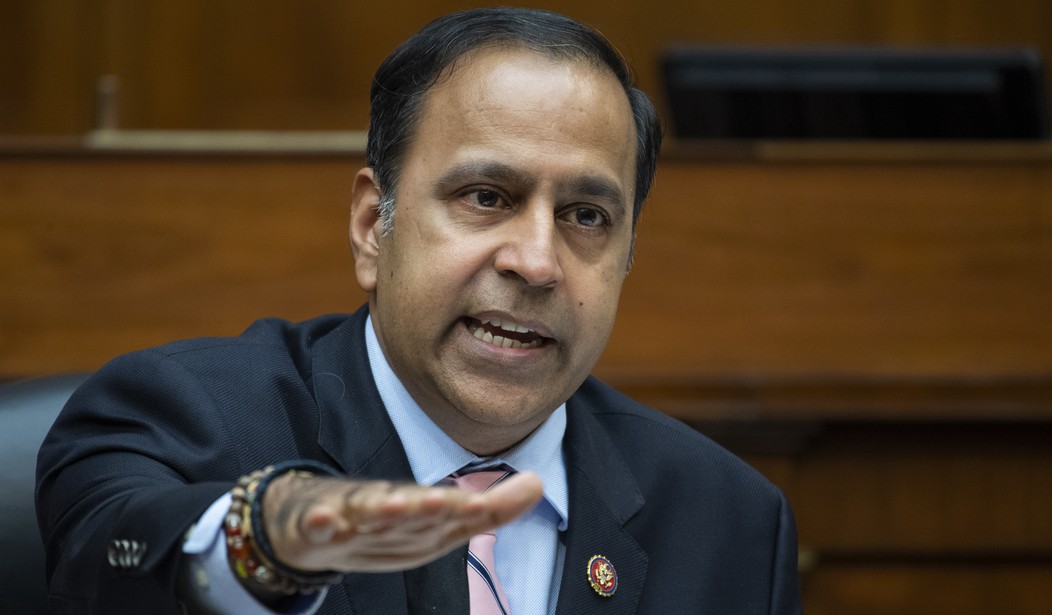Over the past decade or so, examples abound of American corporations kowtowing to the Chinese Communist Party (CCP) so that they can do business in China and access its rapidly growing middle class consumer market. Although this is disconcerting, it pales in comparison to the actions of BlackRock and other Wall Street investment firms, which are funneling huge sums of money from Americans’ retirement funds into CCP-aligned military endeavors.
Thanks to the diligent efforts of Rep. Mike Gallagher (R-WI) and Rep. Raja Krishnamoorthi (D-IL), who both serve on the Select Committee on the CCP, we now know that, “as a direct result of decisions made by BlackRock…Americans are now unwittingly funding PRC companies that develop and build weapons for the People’s Liberation Army (PLA)—the PRC’s military—and advance the CCP’s stated mission of technological supremacy.”
Gallagher and Krishnamoorthi also note, “By facilitating massive flows of American capital to these and other PRC entities linked to the PLA or to human rights abuses, BlackRock is exacerbating an already significant national security threat and undermining American values.”
According to research gathered by the Select Committee, BlackRock has invested at least “$429 million in PRC companies that pose national security risks to and act directly against the interests of the United States.” However, as the committee’s reports indicate, the total amount of BlackRock investments in Chinese companies building advanced weapons systems, aircraft carriers, fighter jets, and other military hardware is likely much higher than the $429 million figure.
Moreover, BlackRock is also allegedly doing business with companies engaging in slave labor practices and other human rights abuses, despite the fact that several of these companies have been blacklisted by the U.S. government.
Recommended
To be fair, BlackRock is not the only U.S. asset management company to be accused of doing business with the Chinese military industrial complex. In fact, the practice is commonplace across Wall Street.
On August 9, President Biden issued an executive order designed to combat “investments in certain national security technologies and products in countries of concern.” But, the executive order is fatally flawed because it solely applies to “active” investments, which makes up only 17 percent of U.S. investments in China. The order does not apply to “passive” investments (ETFs, mutual funds and exchange-listed stocks), which accounts for the other 83 percent of U.S. investments in China. Moreover, the executive order is tailored to restrict investments in artificial intelligence, semiconductors, and quantum computing—leaving a gaping hole for these investment firms to continue to pour money into the CCP’s vast network of military projects.
Fortunately, as Gallagher writes in a recent Washington Post op-ed, there are several ways the U.S. government could solve this problem. Foremost, he recommends that the U.S. government restrict all investments (active and passive) into any and all entities “that support China’s military modernization, the CCP’s forced labor and genocide, or Beijing’s techno-totalitarian surveillance state.” He also advises that U.S. investment restrictions be applied to entire sectors of the Chinese economy as opposed to individual companies “that will inevitably change names and create subsidiaries to avoid restrictions.”
As Gallagher points out, the CCP engages in military and civil fusion, meaning that all companies in China, even those without a direct connection to military matters, are involved in military-based objectives.
During the Cold War, when the United States was engaged in a decades-long struggle for world hegemony with the Soviet Union, it would have been unthinkable for Wall Street investment firms to fund the Soviet military machine. Back then, unlike today, U.S. corporations and asset management companies would have balked at the thought of doing business with the “evil empire.”
Yet, the China situation is decidedly different. About two decades ago, long after the fall of the Soviet Union, world leaders decided to engage with the CCP, allowing China to enter into the World Trade Organization and other international bodies, with the hope that doing so would help liberalize the communist giant.
Unfortunately, this strategy has backfired. Instead of liberalizing, the CCP has used American goodwill and “free” trade to its advantage. Over the years, China has been caught red-handed stealing U.S. intellectual property and cloning U.S. military technologies.
Before the Cold War even began, Vladimir Lenin prophesied, “When it comes time to hang the capitalists, they will vie with each other for the rope contract.”
For far too long, multinational corporations and Wall Street have aided and abetted the rise of communist China. We must cease and desist this foolish policy posture immediately.
Chris Talgo (ctalgo@heartland.org) is editorial director at The Heartland Institute.

























Join the conversation as a VIP Member